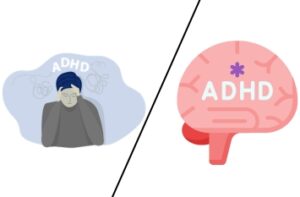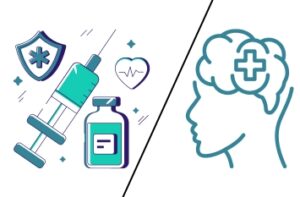
ADHD in Adults: Signs, Symptoms, and Treatment Options in Frisco, TX
ADHD in Adults: Signs, Symptoms, and Treatment Options in Frisco, TX Attention-Deficit/Hyperactivity Disorder, ADHD, is often thought of as a childhood condition, but millions of

In mental health treatment, the prescription of medication plays a pivotal role in alleviating symptoms, managing conditions, and improving overall well-being. Prescribing medication for mental health concerns requires a professional approach due to the profound impact it can have on individuals’ lives.
According to a comprehensive study published in the Journal of Clinical Psychiatry, the appropriate prescription and management of psychiatric medication significantly correlate with improved treatment outcomes and enhanced patient safety.
Throughout this blog, we will explore who can prescribe medication for mental health conditions, exploring the qualifications, roles, and limitations of various mental health professionals.
Psychiatrists stand at the forefront of mental health prescribing, bringing a wealth of expertise and training to the table. With extensive medical education and specialization in mental health, psychiatrists are uniquely positioned to assess, diagnose, and treat a wide range of psychiatric conditions.
Qualifications: Psychiatrists undergo rigorous medical training, typically completing a bachelor’s degree followed by four years of medical school. Subsequently, they embark on a residency program specializing in psychiatry, which delves deeply into the diagnosis, treatment, and management of mental health disorders.
Role in Prescribing: As medical doctors, psychiatrists possess the authority to prescribe a variety of medications commonly used in mental health treatment, including antidepressants, antipsychotics, mood stabilizers, and anxiolytics.
Their comprehensive understanding of both the physiological and psychological aspects of mental health allows them to tailor medication regimens to suit individual needs.
In recent years, psychiatric nurse practitioners (PNPs) have emerged as valuable contributors to the field of mental health care, particularly in bridging gaps in access to services.
Ability to Diagnose and Prescribe: PNPs hold advanced degrees in nursing and have completed additional training in psychiatric-mental health care. They are authorized to assess, diagnose, and prescribe medication for mental health conditions, often under the supervision of psychiatrists.
Increasing Role in Mental Health Services: PNPs play a crucial role in expanding access to mental health care, especially in underserved areas where psychiatrists may be scarce. Their ability to provide comprehensive care, including medication management, empowers individuals to receive timely and effective treatment for their mental health concerns.
As the landscape of mental health care evolves, the collaborative efforts of psychiatrists and psychiatric nurse practitioners continue to enhance access, quality, and effectiveness of treatment options available to individuals seeking support for their mental well-being.
Despite the traditional limitations on therapists’ prescribing authority, an emerging trend involves certain therapists obtaining prescriptive authority in some states, particularly psychiatric nurse practitioners and some clinical psychologists.
1.Explanation of Prescriptive Authority:
In some jurisdictions, certain therapists, such as psychiatric nurse practitioners and a limited number of clinical psychologists, have undergone additional training and obtained specific licensure or certification that grants them the authority to prescribe medication for mental health conditions.
2.Rigorous Training and Additional Qualifications:
Therapists seeking prescriptive authority undergo extensive training and education beyond their initial licensure or degree requirements. This training typically includes coursework in psychopharmacology, pharmacotherapy, and clinical practice, as well as supervised clinical experience in prescribing medication under the guidance of experienced professionals.
Licensed psychologists play a crucial role in mental health treatment, offering specialized expertise in assessment, therapy, and psychological interventions. However, it’s important to note that in most jurisdictions, psychologists do not have the authority to prescribe medication.
Inability to Prescribe Medication: Unlike psychiatrists and psychiatric nurse practitioners, psychologists typically do not have prescribing privileges. Instead, they focus on conducting comprehensive assessments, providing evidence-based therapy, and collaborating with prescribers to ensure holistic treatment approaches.
Role in Assessment and Therapy: Psychologists are trained to assess and diagnose mental health conditions using standardized assessment tools, interviews, and observation. Through various therapeutic modalities such as cognitive-behavioral therapy (CBT), psychodynamic therapy, and interpersonal therapy, they help individuals explore and address psychological challenges.
Collaboration with Prescribers: While psychologists cannot prescribe medication themselves, they often collaborate closely with psychiatrists or other medical professionals who do have prescribing privileges. This collaborative approach ensures that individuals receive integrated care that addresses both psychological and pharmacological aspects of their mental health needs.
Counselors, also known as Licensed Professional Counselors (LPCs), primarily focus on providing talk therapy and counseling services to individuals, couples, families, and groups. Unlike psychiatrists and certain other mental health professionals, counselors typically do not have the authority to prescribe medication.
Limitations in Prescribing Medication: In most jurisdictions, counselors do not have prescribing privileges and are not authorized to prescribe medication for mental health conditions. Instead, they specialize in psychotherapy and counseling techniques aimed at addressing emotional, behavioral, and interpersonal challenges.
Expertise in Counseling and Support Services: Despite their inability to prescribe medication, counselors are highly skilled in providing evidence-based therapy modalities such as cognitive-behavioral therapy (CBT), dialectical behavior therapy (DBT), and mindfulness-based approaches.
They offer a supportive and nonjudgmental space for individuals to explore their thoughts, feelings, and experiences, facilitating personal growth and emotional healing.
Licensed Clinical Social Workers (LCSWs) play a vital role in the mental health field, employing a holistic approach to address the complex needs of individuals, families, and communities. While social workers are trained to provide therapy, advocacy, and case management, they typically do not have the authority to prescribe medication.
Role in Providing Therapy, Advocacy, and Case Management: Social workers are trained to assess and treat a wide range of mental health issues, including depression, anxiety, trauma, and substance abuse. They offer therapy services aimed at enhancing coping skills, improving interpersonal relationships, and fostering resilience.
Inability to Prescribe Medication in Most Cases: In the majority of jurisdictions, social workers do not have prescribing privileges and are not authorized to prescribe psychiatric medication. However, they collaborate closely with other mental health professionals, such as psychiatrists and psychiatric nurse practitioners, to ensure comprehensive care for their clients.
While counselors and social workers do not typically have the authority to prescribe medication, their expertise in therapy, counseling, and holistic approaches to mental health make them invaluable members of the mental health treatment team.
Through collaboration and interdisciplinary teamwork, they contribute to the delivery of comprehensive and person-centered care for individuals seeking support for their mental well-being.
In mental health treatment, while psychiatrists and psychiatric nurse practitioners serve as primary prescribers, counselors and social workers provide invaluable therapy, advocacy, and support services. Despite their expertise in talk therapy and holistic approaches, counselors and social workers typically lack the authority to prescribe medication.
However, through collaborative efforts with prescribers, they ensure comprehensive care for individuals seeking support for their mental well-being. By embracing interdisciplinary approaches and prioritizing collaboration, we can better meet the diverse needs of individuals and foster a more inclusive and effective mental health care system.

ADHD in Adults: Signs, Symptoms, and Treatment Options in Frisco, TX Attention-Deficit/Hyperactivity Disorder, ADHD, is often thought of as a childhood condition, but millions of

The human mind can be a complex and ever-evolving entity. We all desire to live our best life

Understanding Long-Acting Injectables (LAIs) in Psychiatry: Benefits and Applications Managing mental health conditions such as schizophrenia, bipolar disorder, or severe depression often requires a consistent
